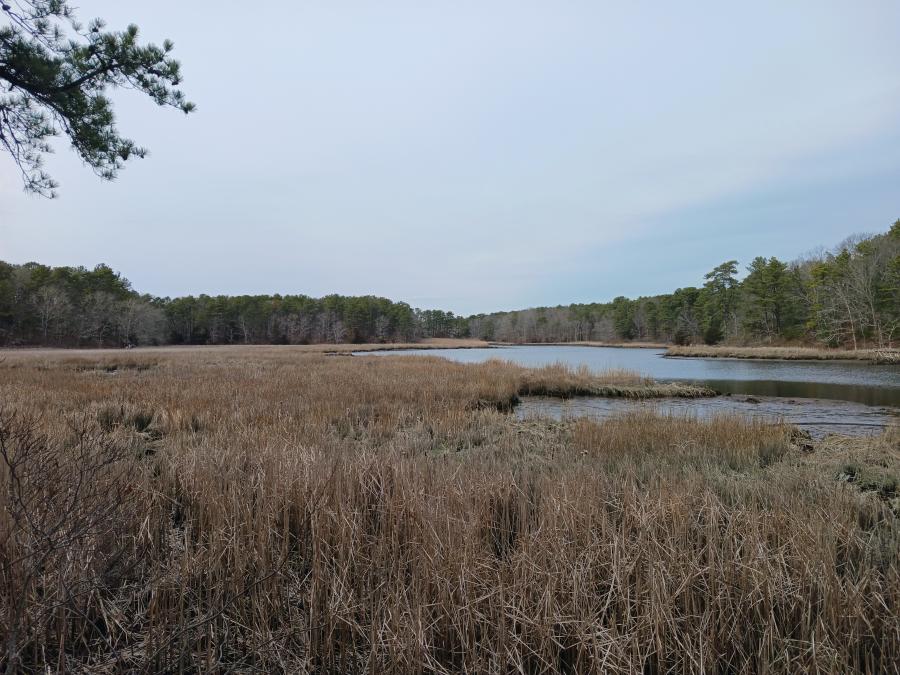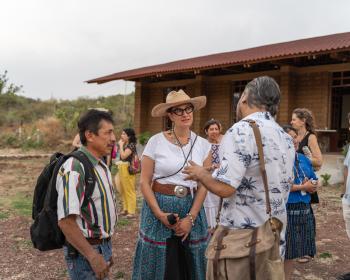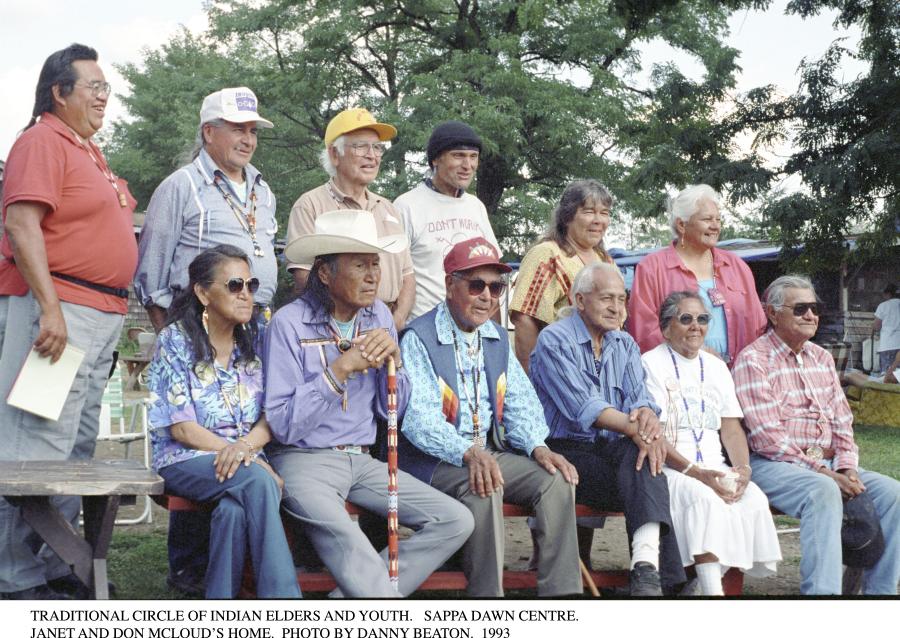
Leadership from three Cherokee nations came together last week to mark the opening of the Eastern Band of Cherokee Indians’ Kituwah Academy, a language immersion school for preschool through fifth grade students located in Cherokee, North Carolina.
“This is what you call a dream come true,” proclaimed Wiggins Black Fox, before delivering an opening prayer in the Cherokee language. Leroy Littlejohn, also of the Eastern Band, and Cherokee Nation representatives from Oklahoma, Tom Belt and George Byrd, also delivered opening prayers in the language.
Gesturing at the Great Smoky Mountains surrounding the school, Chief George Wickliffe of the United Ketoowah Band of Cherokee, also from Oklahoma, reminded the audience, “We came from here. We were the ones who received that fire up on that mountain.”
In 1838 ancestors of the Ketoowah and Cherokee Nation in Oklahoma were relocated from their southeastern homelands by military force in direct violation of a Supreme Court ruling affirming their rights to their traditional territory. Ancestors of the Eastern Band of Cherokee Indians evaded military relocation, accepted citizenship and small plots of individual land, or walked back to North Carolina from Oklahoma after removal. Today, all three Cherokee nations are enjoying an economic renaissance from gaming revenues and other profitable tribal enterprises. Drawing strength and cohesion from their cultural and linguistic heritage, painstakingly maintained over the centuries—and a unique 86-character syllabary developed in the early 19th century—the three nations are once again joining together in an epic multigenerational battle to preserve their ancient language. The Cherokee Nation of Oklahoma opened its own language immersion school in 2003—their proven curriculum serves as the basis for the Eastern Band's—and according to Chief Wickliffe, the Ketoowah Band is exploring implementing immersion education as well.
Eastern Band Chief Michell HicksFor those one hundred fifty celebrants gathered in Cherokee beneath an unusually warm October sun, the show of tribal unity was a fitting conclusion to the efforts of four separate tribal administrations who tackled language education, while the numbers of fluent Cherokee speakers dwindled around them. Today, language advocates in all three Cherokee tribes refer to the language as “the fire that represents the center of our nation.”
Former chief Joyce Dugan, who now serves as superintendent for Cherokee Central Schools—a partner to establishing the academy’s North Carolina state certification—said, “I always believed the tribe needed to take a stronger stance on language education [but] it was always about money and being able to provide adequate resources.” Under her administration in the 1990s the tribal council approved the establishment of a Cultural Resources Division, and “We talked about immersion then… I believed the tribe needed to provide the resources. So it has taken four chiefs to finally realize this academy. We have to accomplish the reverse of what the boarding schools did—but the good thing about this is that the students are not going to be punished for speaking English.” Dugan commended the ongoing focus on immersion education for its capacity to create “strong thinkers,” and went further in her praise for the instructional method: “I understand that children who learn two languages are the smartest of all.”
Kituwah manager Renissa Walker and immersion studentsAcademy administrator Gilliam “Gill” Jackson, a long-time teacher, also spoke of the positive impacts of immersion education, reflecting on the many times over the years he has asked himself “Did I have an impact?”—while wondering how his former sixth grade students would progress. “Oftentimes we don’t see the impact we have on a child for years. Sometimes it takes a lifetime. In the course of our immersion program we can see the impact and influence we have on these children in a matter of months, sometimes within weeks, and even in a few hours. It’s easy for these little fellas. They’re having to act and think quickly in two languages, and using their brains in ways most with only one language never will.”
Pausing often to regain his composure, Jackson related his wonderment at the demeanor and boundless curiosity of his young charges who can converse about everything from “ants on the playground, the river that’s flooded, the blue sky, the clouds, the rain coming down, and the little girl talking about the mice in her home.” His students constantly surprise him with their sense of humor—“exactly the same as that among our older fluent speakers”—and with the commentary they can carry on in Cherokee:
“Gail, your breath stinks.”
“Mom and Dad, you’re doing good to learn the language too.”
Kituwah Academy studentsBut most of all, he marvels at their capacity to bond with each other: “They say ‘I love you’ to each other all the time—sometimes when one’s leaving [the classroom] for only fifteen minutes they’ll all jump up—sometimes I know it’s kind of disruptive to the teachers. They’ll say it again when the child comes back—that’s the kind of love these little babies have for each other. I’m convinced they’ll be our future council leaders, doctors, psychologists, attorneys, teachers, and most importantly, strong moms and dads.”
Students in line for ribbon-cutting ceremony at Kituwah Academy grand openingWith only 420 fluent elderly speakers remaining among the Eastern Band communities in North Carolina, tribal officials and language advocates in 2004 opened a preschool immersion program for six babies. Those children now form the kindergarten class at Kituwah Academy, and will remain full-time students at the immersion school through their fifth grade year, by which time their second-language Cherokee speaking and writing skills will be firmly internalized. The community estimates that by 2011 as few as 200 fluent speakers will still be living among elder generations, so the training of 32 language-fluent children comes at a critical time in their struggle to save the language. The school also maintains a waiting list, and will admit children invididually to ease their transition to the new language environment. Students will study English after school with an instructor, but are not allowed to use English during the school day.
Drawing from the immersion education programs enacted among the Maori, Native Hawaiians, Mohawk and Piegan people, the Eastern Cherokee intend for future graduates of New Kituwah Academy to serve as the foundational generations of Cherokee language speakers who will return the spoken Cherokee language to tribal spheres of governance, education, and other community gatherings. Students of New Kituwah and their families are also tasked with re-establishing intergenerational language transmission in Cherokee homes. Parents commit to enrolling in day or evening language classes, and to connecting their student with a fluent speaker—a relative, neighbor, or family friend—on a daily basis.
Renissa Walker, Kituwah Preservation and Education Program managerKituwah Academy will also administer a four-tier language career-track program in order to produce the teachers they’ll need in the near future: “Staffing is the single most pressing issue” for the school, according to their program manager Renissa Walker. Tribal citizens can apply to become community language instructors, K-5 language specialist assistants/instructional assistants, K-5 language specialists, and Kituwah Academy Teachers. The academy, which is administered by the Kituwah Preservation & Education Program (KPEP), will also continue to utilize a valued pool of volunteers, second language learners, and mentors. In addition, the Eastern Band’s Education & Training Department offers college internships for tribal students who can request to be placed with KPEP.
Walker riveted those in attendance at the academy’s grand opening when she told the story of Mary Smith Snead, born in 1915, who as a young girl was taken from her family and placed in a government boarding school where both girls and boys had their heads shaved, and boys were put in dresses as punishment for speaking their language. Both of Mary’s daughters, Sarah and Rosanna, were in the crowd, and Walker thanked them for sharing their mother’s history, and exhorted them to “Tell Mary about this place – a school where every prayer is in the Cherokee language.” Walker spoke of her community having come “full circle” through “the young people who are striving to fill our generation gap between our young speakers and our oldest fluent speakers.” She thanked the many volunteers, speakers, and parents—“my immersion family”—and current Chief Michell Hicks who helped bring the school to fruition: “Our language program has flourished under his leadership.”
Chief Hicks accepted honorary gifts from academy staff—hand crafted traditional basketry and a gleaming metal gorget medallion—and acknowledged the community-wide efforts that led to the school: “There are many people who’ve been a part of this, and it’s not about taking credit, but taking pride together.” Funding for the more than $6.5 million in renovations to the facility, originally built in the late 1940s, came from a combination of Eastern Band tribal funds and a $1.3 million grant from the Cherokee Preservation Foundation, an independent nonprofit foundation established in 2000 as part of the tribal-state gaming compact with the state of North Carolina to "improve the quality of life of the Eastern Band of Cherokee Indians and strengthen the western North Carolina region."
Kituwah Academy classroom displayFormer chief Dan McCoy—whose youngest daughter now attends Kituwah Academy—cited language as a primary focus of questioning posed by federal legislators and administrators who sought to undermine Cherokee nationhood during his 27 years of service to the tribe. “We have to prove about having our language all the time. Language is one of the things we get challenged about – are we still Cherokee?
Many years ago people were punished and made to feel ashamed. But some kept it at home. I think Gill Jackson is part of that group... You have given our children a gift of knowledge that is rightfully theirs, and our speakers in our community have a place of refuge.
The staff and children… they are our true Cherokee heroes. No longer is our language dying. It will be given the respect it is due… This is not a day of ‘grand opening.’ It’s not a day of reckoning, but a day in history. Our little kids are going to talk about this… as the resurrection of our language.”
Photos by Jamie Malcolm-Brown. Send story comments and corrections to jweston[at]cs[dot]org









